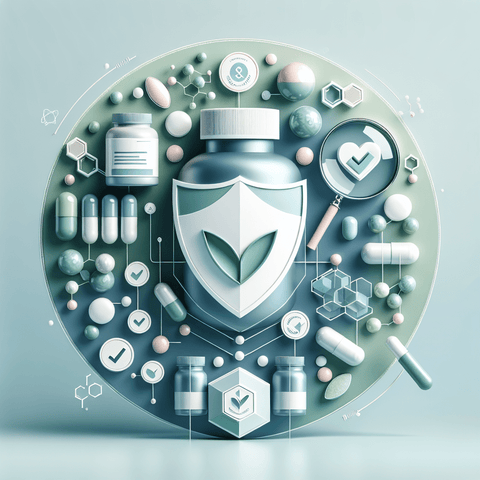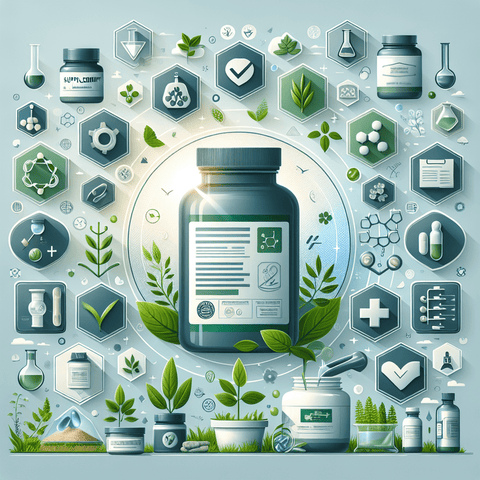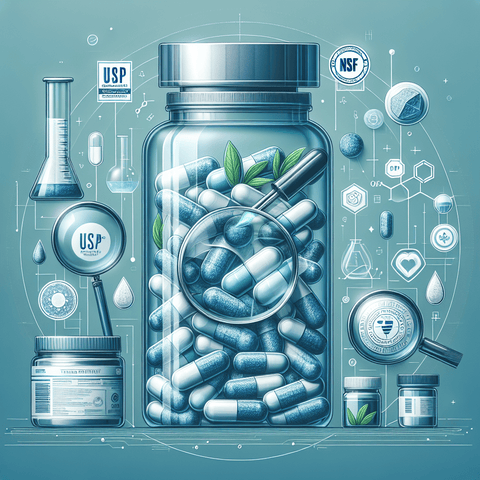Introduction
In today’s health-conscious world, nutritional supplements have become a fundamental part of many individuals' wellness routines. From boosting immunity and enhancing energy levels to supporting bone health and cognitive function, supplements are often viewed as an essential addition for achieving optimal health. As the supplement industry expands rapidly to meet increasing consumer demand, so does the complexity surrounding product safety, quality, and efficacy. This growth brings with it notable concerns about the authenticity of ingredients, contamination risks, and truthful labeling.
Consumers are becoming more vigilant, seeking trustworthy sources for their supplemental needs. A critical component in ensuring supplement safety and quality is third-party testing—an independent verification process that helps prevent adulteration, mislabeling, and contamination. Despite this, many consumers remain unaware of what third-party testing entails or how to interpret these certifications. The purpose of this comprehensive guide is to demystify supplement third-party testing, explain its significance for safer nutrition, and provide you with the knowledge needed to make informed decisions when choosing supplements to support your health goals.
1. Supplement Testing: The First Line of Defense in Nutritional Supplement Safety
Supplement testing refers to the rigorous analysis performed on dietary products to ensure they meet specific quality, safety, and potency standards before reaching consumers. This process involves screening for a variety of factors, including active ingredient concentration, contamination with harmful substances, and adherence to labeling claims. Testing safeguards consumers from potential health risks and provides confidence that the supplement they’re taking delivers the promised benefits.
The main types of tests performed include potency testing, to verify that the supplement contains the amount of active ingredients claimed; contaminant testing, which detects harmful substances such as heavy metals, microbes, pesticides, or adulterants; and purity testing to ensure the absence of unwanted substances that could compromise safety or efficacy.
These testing practices are critical because the supplement industry is less regulated than pharmaceuticals, which means manufacturers often have limited oversight for raw ingredients and manufacturing processes. As a result, relying solely on manufacturer claims may not be sufficient. Commonly used testing methods include High-Performance Liquid Chromatography (HPLC), Inductively Coupled Plasma Mass Spectrometry (ICP-MS), and microbial assays—each designed for specific analyses. However, despite these measures, some limitations exist, such as the potential for false negatives or incomplete contamination detection, underscoring the importance of independent verification.
2. Independent Supplement Verification: Ensuring Unbiased Quality Checks
Independent verification is a process conducted by independent organizations that test and certify dietary supplements, providing an unbiased assessment of their quality and safety. Unlike manufacturer-led testing, which can sometimes be influenced by commercial interests, third-party verification agencies operate without any stake in the product, ensuring integrity and impartiality. This independence is vital for consumers who want assurance that a supplement has been objectively evaluated.
These organizations perform comprehensive audits of manufacturing facilities, review raw material sourcing, validate testing results, and verify lab procedures to ensure compliance with rigorous standards. Their seals or certifications, such as those from NSF International or the United States Pharmacopeia (USP), are visible indicators of adherence to high quality benchmarks.
Reputable independent agencies have a significant impact on consumer safety by catching potential issues before a product hits the shelves. For example, many brands that participate in third-party certification programs regularly undergo surveillance testing, which helps prevent incidents like contamination with heavy metals or the inclusion of banned substances. A notable case demonstrating this is the certification of vitamin D supplements, which ensures that consumers receive safe dosages without the risk of toxicity. Consumers can trust brands with established third-party seals, knowing they meet stringent safety and quality standards, thus making more informed health choices.
3. Third-Party Quality Assurance: Building Consumer Confidence in Supplement Brands
Third-party quality assurance involves various protocols and procedures that supplements undergo to confirm their safety, potency, and purity before reaching the market. This process is often embedded in a brand’s quality control system, but when performed or verified by an independent entity, it assures consumers of unbiased validation.
The process generally includes third-party audits of manufacturing facilities, raw material inspections, ongoing product testing, and verification of label accuracy. Standards such as Good Manufacturing Practices (GMP) from organizations like NSF or USP guidelines serve as the foundation for these quality assurance programs. During these audits, inspectors look at manufacturing cleanliness, process controls, documentation procedures, and testing protocols to ensure compliance with industry standards.
The benefits of third-party assurance extend past consumer trust; they also help manufacturers identify areas for improvement in their processes, leading to higher product consistency and safety. For consumers, visible seals such as the NSF Certified for Sport or USP Verified mark serve as reliable indicators of a product’s commitment to quality. For example, brands that utilize third-party assurance programs typically display these certifications prominently, giving consumers peace of mind when purchasing products like [vitamin C](https://www.topvitamine.com/collections/vitamin-c-benefits-immunity-antioxidant-energy) or [magnesium](https://www.topvitamine.com/collections/magnesium-benefits-energy-muscle-bone-support).
4. Unbiased Supplement Analysis: The Cornerstone of Reliable Nutritional Information
Unbiased supplement analysis refers to laboratory testing conducted independently, free from any influence or conflict of interest, to verify the contents and safety of dietary products. This objective testing is essential because it ensures that label claims are accurate and ingredients are authentic, addressing issues like adulteration and mislabeling that are prevalent in the industry.
Unlike in-house or self-reporting methods, unbiased analysis is performed solely by laboratories with no financial or corporate ties to the supplement brand. These objective tests utilize advanced analytical techniques such as HPLC, ICP-MS, and microbiological assays to detect contaminants like heavy metals, microbial contamination, or undeclared ingredients that could pose health risks.
Unbiased analysis not only confirms product authenticity but also helps uncover case studies where contaminated or mislabeled supplements have caused adverse health effects. For example, some herbal supplements have historically been found to contain undisclosed pharmaceutical ingredients, leading to serious health consequences. Rigorous, independent analysis has prevented such products from reaching vulnerable consumers, enhancing industry accountability and consumer safety. Consumers should look for products tested and certified by trusted third-party laboratories to ensure they are getting exactly what they pay for.
5. Supplement Ingredient Transparency: Empowering Consumers with Honest Information
Ingredient transparency is vital in helping consumers make safe and informed choices about their dietary supplements. Transparency involves clear, honest labeling of all ingredients, their sources, and any processing aids used in manufacturing. When manufacturers disclose complete ingredient lists and guarantees verified through third-party testing, consumers gain confidence in the product’s authenticity and safety.
Despite regulatory requirements, some products are still found to contain undisclosed ingredients or hidden additives. These hidden substances may sometimes include preservatives, artificial flavorings, or contaminants introduced during manufacturing. Third-party testing plays a crucial role in exposing these hidden elements by independently verifying the actual composition of the product against label claims.
Look for labels indicating third-party verification, such as the NSF-certified or USP-verified symbols, which reflect transparency and adherence to quality standards. Additionally, tools like supplement databases from trusted agencies or certification seals can help identify products that prioritize ingredient honesty. For example, critical nutrients such as [vitamin D](https://www.topvitamine.com/collections/vitamin-d-benefits-sources-safety) or [Vitamin K](https://www.topvitamine.com/collections/vitamin-k-benefits-bone-blood-health) often have more transparent labeling due to third-party scrutiny, ensuring consumers receive accurate information about their supplements.
6. Verified Supplement Safety: Confirming Supplements Meet Rigorous Safety Standards
Safety verification is the process of ensuring that dietary supplements are free from harmful substances and meet safety standards set by regulatory and industry bodies. For consumers, selecting verified supplements means reducing the risk of exposure to unsafe levels of heavy metals, microbial contaminants, or banned substances like stimulants in weight-loss products.
Third-party testing identifies potential safety risks by analyzing raw materials and finished products. For example, heavy metal testing detects traces of lead, arsenic, or mercury, which can accumulate in herbal or mineral supplements. Microbial testing ensures cleanliness from potentially pathogenic bacteria, yeast, or molds that could cause illness. Banned substance detection is especially important for athletes or those subject to drug testing, as contamination with stimulants or diuretics can lead to serious consequences.
Public health benefits from verified supplement safety are significant, reducing incidents of poisoning, toxicity, and adverse reactions. When choosing safe, verified supplements, look for third-party seals or certifications and consider reputable sources like [topvitamine’s vitamin C](https://www.topvitamine.com/collections/vitamin-c-benefits-immunity-antioxidant-energy) or [DHA/EPA omega-3](https://www.topvitamine.com/collections/dha-epa-omega-3-supplements) collections, which undergo rigorous testing processes to ensure safety and efficacy.
Conclusion
Third-party testing and verification are essential pillars in safeguarding consumers’ health when it comes to dietary supplements. These processes provide an objective assessment of product quality, safety, and transparency—supporting informed choices and fostering trust in the supplement industry. As a consumer, recognizing third-party seals, understanding what they signify, and prioritizing verified products can help ensure you are supplementing with safe, high-quality products that genuinely support your health goals.
Always research brands thoroughly, look for reputable certifications, and consider products from trusted sources like Topvitamine, which offer supplements with verified quality and safety assurances. Advocating for transparency within the industry encourages better manufacturing practices and helps raise standards across the board.
Remember, your health is your most valuable asset—select supplements that are transparently tested and verified to support your well-being effectively and safely.
Q&A Section
- Q: Why is third-party testing important for dietary supplements?
- A: Third-party testing provides unbiased verification of supplement safety, potency, and purity. It helps prevent contamination, mislabeling, and adulteration, ensuring consumers receive exactly what is stated on the label and reducing health risks.
- Q: How can I identify if a supplement has undergone third-party verification?
- Look for certification seals from reputable independent agencies such as NSF International or USP. These seals are usually prominently displayed on the packaging and indicate the product has been thoroughly tested and verified by an unbiased organization.
- Q: Are all supplement brands equally trustworthy?
- No, trustworthiness varies. Brands that participate in third-party testing and display verification seals are generally more reliable. Always research the brand’s testing protocols and seek products with transparent ingredient labeling and certification.
- Q: What are common safety concerns that third-party testing can detect?
- Third-party testing can detect heavy metals (like lead or mercury), microbial contamination (bacteria, molds), allergens, undeclared ingredients, and banned substances, thereby ensuring the safety of the supplement.
- Q: Can third-party testing guarantee the effectiveness of a supplement?
- No, third-party testing primarily verifies safety, ingredient accuracy, and purity. While it ensures product quality, it does not confirm the supplement’s efficacy or health benefits. Always consult healthcare professionals about supplement use for health outcomes.
Important Keywords
- Supplement third-party testing
- Independent supplement verification
- Supplement quality assurance
- Supplement safety standards
- Supplement ingredient transparency
- Unbiased supplement analysis
- Third-party certification symbols
- Safest dietary supplements
- Heavy metals testing in supplements
- Verified supplement brands
- Supplement contamination detection
- Supplement label accuracy



